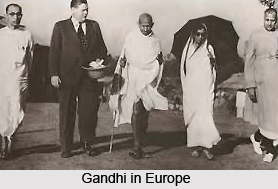 Mahatma Gandhi played an important role during the World War I. In the latter part of the war, the Viceroy invited Gandhi to a War Conference in Delhi. This may have happened in order to show support for Empire and also help his case for Independence of India. Mahatma Gandhi also agreed to seriously recruit Indians for the war efforts. In contrast to Zulu War of 1906, and the occurrence of World War I in 1914, when he recruited volunteers for the Ambulance Corps, this time Gandhi attempted to recruit combatants.
Mahatma Gandhi played an important role during the World War I. In the latter part of the war, the Viceroy invited Gandhi to a War Conference in Delhi. This may have happened in order to show support for Empire and also help his case for Independence of India. Mahatma Gandhi also agreed to seriously recruit Indians for the war efforts. In contrast to Zulu War of 1906, and the occurrence of World War I in 1914, when he recruited volunteers for the Ambulance Corps, this time Gandhi attempted to recruit combatants.
In the year 1918 in the month of June, Mahatma Gandhi, wrote something quite different from his own philosophy. In a leaflet titled "Appeal for Enlistment" Gandhi wrote "To bring about such a state of things we should have the ability to defend ourselves, that is, the ability to bear arms and to use them. If we want to learn the use of arms with the greatest possible despatch, it is our duty to enlist ourselves in the army." He did of course in his letter to the private secretary of viceroy made it very clear that he would personally will not kill or injure anybody, foe or friend.
This campaign for Gandhi`s war recruitment campaign brought into question his consistency on non-violence. His friends, during that time also confirm that they have not been able to reconcile the two - one of course is of recruitment campaign and other one being his own theory on non-violence. Gandhi`s private secretary also had acknowledged that the question of the consistency between his creed of "Ahimsa" (non-violence) and his recruiting campaign was raised not only then but has been discussed ever since.
This article is a stub. You can enrich by adding more information to it. Send your Write Up to content@indianetzone.com




















